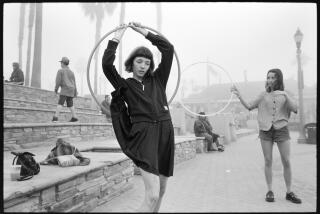VIDEORGY: Like it or not, most critics...
- Share via
VIDEORGY: Like it or not, most critics agree that there’s nothing quite like “Absolute Beginners,” Julien Temple’s splashy new ‘50s musical about the dawn of the England’s rock era. Full of swooping pans and dolly shots--after awhile, you begin to feel as if the camera’s mounted on an F-16--it’s a visual extravaganza that can only be described as “West Side Story” on LSD. According to Temple, who’s out promoting the film (and admits to being “mystified” by Orion Pictures’ publicity campaign), the movie’s gaudy cinematic fireworks are merely his way of capturing the convulsive spirit of the age.
“It’s not an archeological exploration so much as a distillation of how rock liberated the spirit of British teen-agers,” said Temple, a veteran rock-video magician who’s worked with everyone from the Rolling Stones and the Kinks to David Bowie and Sade--with an Iggy Pop video up next. “One of the reasons the youth culture in Britain was so exotic and colorful was that everyone was rebelling against the drab, repressed Victorian sensibility--that morbid Englishness that had ruled the culture for so long.
“We wanted to stylize reality, but only because that’s the way kids saw it. The real Soho may have been very grim, but in their minds they created a Soho that wasn’t there--a place where you could have own heroes and live by own your own magic rules.”
Temple, whose first job was directing the Sex Pistols film “The Great Rock & Roll Swindle,” complains that today’s British pop culture has become a “Frankenstein’s monster” of rampant commercialism and copy-cat styles. “There are less teen-agers around, so they’re less economically powerful,” he explained. “Rock has become so packaged and homogenized that there’s nothing rebellious or risky about it. Being a teen-ager in London today is like joining the army. They give you a regulation haircut, regulation records to listen to--it’s as if you’ve got a whole style book to follow.”
Now 31, Temple was just a toddler in the late ‘50s, but he says he has an “eerie recall” of images from that era. “It’s as if you sift events through memories that are just out of your grasp,” he said. “I remember lying down on the floor of our set one day--totally exhausted--and seeing all these ‘50s objects strewn everywhere, I’d have these weird flashbacks to being a child, wondering exactly where I was.”
Temple defends the film’s music-video theatrics and lavish sets, which portray the ‘50s not as a real era but as a bubble-hairdoed vision cooked up by a futuristic designer at the 1939 World’s Fair. “You shouldn’t be ashamed of conveying complicated ideas through visual imagery. The best pop videos speak the language of a young audience who’s learned how to read visual information and decode it in a way the cinema hasn’t done since the silent movie era.
“The older critics may complain, but they’re never willing to accept things till it’s 20 years too late. When you make a real musical, you tell the story through the musical numbers--we didn’t do anything differently than Vincente Minnelli did in the last 15 minutes of ‘Band Wagon.’ ”
More to Read
Only good movies
Get the Indie Focus newsletter, Mark Olsen's weekly guide to the world of cinema.
You may occasionally receive promotional content from the Los Angeles Times.










